With each passing year, IT is changing from a service to a solution. Any company who implement any software solution for the improvement of business operations has great expectation from it. Customer Relationship Management (CRM) is not an exemption. The idea of CRM implementation is to reduce operational cost, save time and offer a seamless customer service. Enterprises opt for CRM systems to achieve highest efficiency and productivity. But it’s not sunshine every time. Most of the CRM implementations fail or it couldn’t work the way companies expect.
There are many reasons behind CRM failure. Let’s discuss few very critical reasons behind CRM failure and how we can tackle it.
Unclear Goal & Poor Strategy
This is one of the top reasons behind a CRM failure for many companies. If you are not sure what you want, then it will be difficult to execute the right strategies. Identify your goals and determine what CRM needs your business has. There are 3 aspects which companies lack – Fail to identify the problem, Fail to understand the value of a CRM and Fail Communication. The most important thing to consider before planning for a CRM is to adopt a customer-centric strategy. Companies usually choose a vendor or CRM looking at their future plans rather than considering current needs.
Absence of Predictable Project Execution
Agile development models have replaced traditional waterfall models and became mainstream when it comes to CRM development. What developers do wrong is they ignore basics and use pieces and parts features based on their convenience and make the entire project fail.

You have to consider and involve everyone who is going to use the CRM, in software selection process. CRM will modify business processes, sales methods, employee performance, and strategies. So, you need to make sure that people who are going to use the tool are being considered at first place.
User Adoption
Even if a company implemented a well planned and executed CRM software, it is always a tough task for the end users to adopt it and use it to achieve best possible business results. There must be few employees who may be cautious using CRM. Few might feel it will take their jobs, and few might not be comfortable at all. This might create an unpleasant atmosphere and it will result in a less than 100% productive CRM. Wrong data entry is highly expected in this kind of cases, 40% of the CRM failures happen due to wrong data entry. To resolve this problem, you can take your time in CRM implementation rather than rushing in implementation.
User Training
In past, there are many examples of a CRM failure because of the absence of user training sessions. In order to conduct a quick implementation, organizations ignore proper user training. As a result, things couldn’t fall at the right places and CRM success fail. Let your employees preview and explore the system before formal training. Training should be one-to-one and planned. A virtual training can arise many questions and doubts.
A Wrong Vendor
50% of the CRM fail due to signing a wrong vendor. In order to get a CRM on a lower budget, companies make mistake by not doing proper research on the vendor. There are many vendors who have zero project clarity which could be a mismatch with your business goals. Talk to the other customers of the prospective vendors you are considering. Try service level agreements, assurances, and uptime guarantees. Sometimes you end up paying a huge amount for a CRM designed keeping someone else in mind and features which you are not going to use. You can ignore picking the wrong CRM software by explaining your requirements before selecting a vendor.
READ THIS : “How to Choose the Right Software Development Outsourcing Partner”
Missing Mobile
Most of the CRMs are not compatible with mobile devices. Users use smart devices more than a laptop or desktop. So ignoring this might be a setback. CRM solutions have specific functionalities like location-based services and few other which can add value to your business. Employees who do work from home can be benefited from context-based services. Incorporating enterprise mobility, enterprises can increase support for their CRM implementation strategy. Though many CRM vendors offer mobile apps that might not be useful for all the users. Everyone can have access to an integrated mobile app, but they might not need all the access. So, rather than building a CRM app, it is best to make the CRM mobile friendly, so that you won’t miss any point.
CRM is not only a Tool
CRM is an enterprise-wide effort to improve customer-facing business processes in order to achieve business goals. Companies consider it only as a tech tool for managing customer’s data and delivering high results instead of the precise planning and business processes optimization. The first and foremost of CRM failures is the deployment of the software without a clear and detailed strategic business approach.

Trying to achieve everything at a go will take you nowhere. This will end up with a lot of confusions rather than more efficient business processes. Instead of trying to complete the entire enterprise-wide CRM implementation, you can work on various aspects of your implementation to make your CRM project more focused and fruitful.
CRM without considering Customers
Business is a two-way road. Customers expect attention and value addition. In case you ignore customers and what they want, results won’t be good. The goal of a CRM is to facilitate the relationship with your customers. You have to keep your customers at the centre while considering any CRM. One of the most unfortunate CRM failures will be ignoring the CRM segmentation tool. With CRM marketing automation and email automation, you are going to target specific customers and can offer personalized solutions. CRM will help you get new customers as well as retain existing ones.
Wrapping Up
The biggest CRM implementation failure reason is, companies are trying to implement CRM without understanding their customers and lack of customer outreach. CRM software itself can’t benefit a company and its usage will just limit to record keeping, data management and gather information. But somewhere the main goal increase in “customer relation” will fade. A successful CRM strategy includes work culture development where you need to keep your customers at the centre and be compatible with business objectives. Companies who are able to understand this can make the best use of CRM tools and optimize their business productivity.
How can Apogaeis Help?
Apogaeis is an enterprise CRM developer and has successfully developed many customized CRM for its global partners. We develop interactive and user-friendly CRM which will optimize your business operations and produce higher results. Our CRM works more efficiently. If you are in need of a new CRM, please Contact our team of experts. We will help you build a system which will be a great fit for your business.










very well explained. there are many best CRM software in the market with lots of tools, advantages, and features and I have found the best CRM software for the businesses
THANK YOU FOR THE INFORMATION
Vey Nice And Informative Blog
For a clear understanding of the problems that led to the failure of the projects, it is necessary to analyze the data we already have.